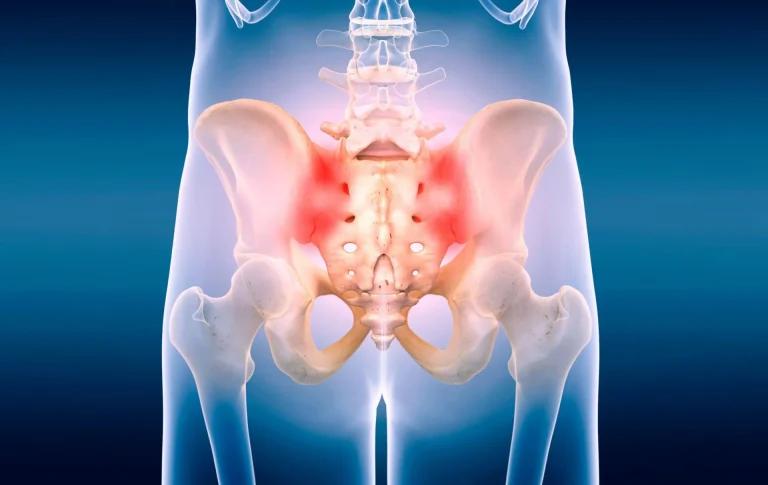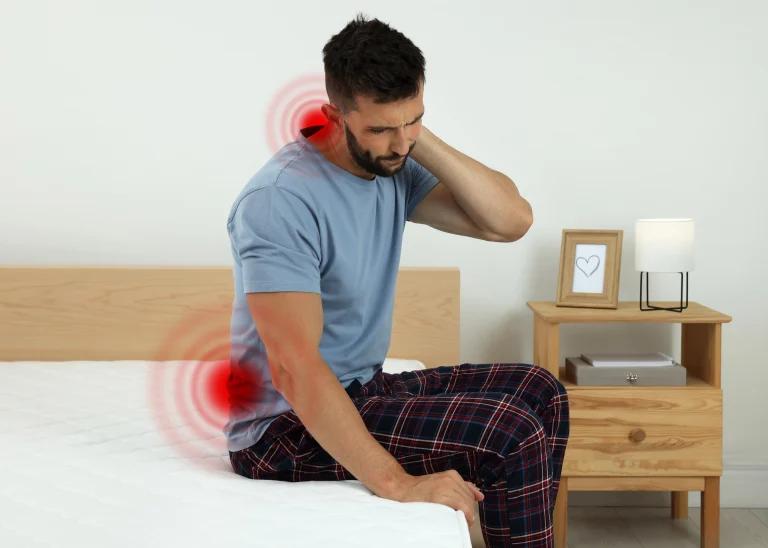
Sciatic nerve pain is often referred to as sciatica or lumbar radiculopathy. Sciatica pain originates from the sciatic nerve located very close to the lumbar spine. It can be a crippling condition that significantly impacts an individual’s quality of life. This article delves into the underlying causes, risk factors, and various treatment options available for this issue, providing you with a basic understanding of this complex condition.
Understanding the sciatic nerve
The sciatic nerve is the longest and thickest nerve in the human body, extending from the lower back through the buttocks and down the legs. It is a bundle of nerves that originate from the spinal cord and branch out into the lower extremities. When this nerve becomes irritated, inflamed, or compressed, it can lead to sciatic nerve pain.
Common causes of sciatica pain
The main causes of sciatic nerve pain are linked to various conditions that affect the spine, surrounding structures, or the nerve itself. Here are the most common causes:
Herniated disk
One of the most common causes of sciatic nerve pain is a herniated or bulging disc in the spine. Spinal discs act as cushions between the vertebrae, but when they become damaged, they can put pressure on the nearby sciatic nerve, leading to pain, tingling, and numbness.
Degenerative disc disease
As individuals age, the spinal discs can gradually degenerate, leading to degenerative disc disease. This can result in the narrowing of the spinal canal, which can compress the sciatic nerve and cause pain.
Spinal stenosis
Spinal stenosis is characterised by the narrowing of the spinal canal, often due to the overgrowth of bone or thickening of ligaments. This narrowing can put pressure on the sciatic nerve, triggering the symptoms of sciatica.
Piriformis syndrome
The piriformis muscle is located in the buttocks and can sometimes spasm or tighten, compressing the sciatic nerve and causing pain that radiates down the leg. This is known as piriformis syndrome.
Pregnancy-related sciatica
Sciatica is relatively common during pregnancy, as the growing fetus can put pressure on the sciatic nerve, particularly in the later stages of pregnancy. Increased weight and hormonal changes during pregnancy can also contribute to the development of sciatic nerve pain.
Injury or trauma
Injuries to the back, such as a herniated disc or a fracture, can also lead to sciatic nerve pain. Sudden trauma, like a car accident or a fall, can cause the spine to become misaligned or the surrounding structures to become inflamed, resulting in sciatic nerve irritation.
Bone spurs
Bone spurs, or abnormal bone growths, can develop along the spine and put pressure on the sciatic nerve, leading to pain and discomfort.
Tumors or cysts
In rare cases, tumors or cysts in the spine or surrounding areas can cause sciatic nerve pain by compressing or irritating the nerve.
Risk factors for sciatic nerve pain
Several risk factors can increase an individual’s susceptibility to this condition:
Age
As people age, the spine and its structures are more prone to degeneration, making older individuals more susceptible to sciatic nerve pain.
Obesity or excess weight
Carrying extra weight, especially around the midsection, can put added strain on the spine and increase the risk of developing sciatic nerve pain.
Occupational factors
Heavy lifting, prolonged sitting, or repetitive bending and twisting of the spine can contribute to the development of sciatic nerve pain.
Sedentary lifestyle
A lack of physical activity and a sedentary lifestyle can weaken the back and core muscles, making the spine more vulnerable to injury.
Diabetes
Individuals with diabetes have an increased risk of developing peripheral neuropathy, which can contribute to or worsen sciatic nerve pain.
Genetics
Genetic factors may play a role in the predisposition to certain spinal conditions that can lead to sciatic nerve pain.
Symptoms of sciatic nerve pain
Classic symptoms of sciatica is a sharp shooting pain, sometimes described as a burning sensation that radiates from the lower back, down through the buttocks and into the legs. Other common symptoms include:
- Numbness or tingling (pins and needles) in the affected leg or foot
- Weakness or difficulty moving the leg or foot
- Difficulty standing or walking
- Increased pain when coughing, sneezing, or sitting for prolonged periods
The severity and location of the symptoms can vary depending on the underlying cause and the specific nerve roots affected.
Diagnosing sciatic nerve pain
Healthcare professionals typically follow a multi-step process:
- The healthcare provider will ask about your symptoms, medical history, and any recent injuries or traumas. They will also perform a physical examination, including tests to assess muscle strength, reflexes, and range of motion
- Depending on the suspected cause, your healthcare provider may order imaging tests such as X-rays, MRI scans, or CT scans to visualise the spine and identify any underlying structural issues
- Nerve conduction studies and electromyography to measure the electrical activity of the nerves and muscles, to confirm the presence and severity of nerve damage or compression
- Your healthcare provider may administer a local anaesthetic or corticosteroid injection into the affected area to help identify the specific nerve root causing the pain
Treatment options for sciatic nerve pain
Treatment involves a combination of standard and, in some cases, more advanced treatments. The treatment plan will depend on the underlying cause, the severity of the symptoms, and the individual’s response to various therapies.
- Rest and icing: During the initial acute phase, resting the affected area and applying ice can help reduce inflammation and pain
- Medications: Over-the-counter anti-inflammatory medications, such as ibuprofen or naproxen, can help with pain relief and inflammation
- Physical therapy: A physical therapist can design an exercise program to improve flexibility, strengthen the core and back muscles, and promote proper posture and spine alignment
- Alternative therapies: Treatments such as acupuncture, massage therapy, and yoga may provide additional relief
Advanced treatments
- In cases where conservative treatments are not effective, healthcare providers may administer epidural steroid injections to reduce inflammation and pain
- Targeted anaesthetic injections or other medications can help block the transmission of pain signals from the affected nerve
- In severe cases that do not respond to other treatments, surgery may be recommended to address the underlying cause
Preventing sciatic nerve pain
Several lifestyle and preventive measures can help reduce the risk of developing this condition:
- Maintaining a healthy weight and engaging in regular physical activity
- Practicing good posture and proper body mechanics, especially when lifting heavy objects or engaging in physical activities
- Incorporating stretching and flexibility exercises into your daily routine
- Quitting or avoiding the use of tobacco products, as they can contribute to spinal degeneration and nerve damage
- Seeking prompt medical attention for any back injuries or persistent pain
By understanding the underlying causes, risk factors, and effective treatment options, individuals can take proactive steps to manage and prevent the development of sciatic nerve pain.
Conclusion
Sciatic nerve pain is a complex condition that can significantly impact an individual’s quality of life. By understanding the causes, recognising the symptoms, and exploring the treatment options available, you can take control of your sciatica.
Sources
- Sciatica: What It Is, Causes, Symptoms, Treatment & Pain Relief
- Sciatica – Diagnosis and treatment – Mayo Clinic
- Sciatica – NHS
Medical Disclaimer
NowPatient has taken all reasonable steps to ensure that all material is factually accurate, complete, and current. However, the knowledge and experience of a qualified healthcare professional should always be sought after instead of using the information on this page. Before taking any drug, you should always speak to your doctor or another qualified healthcare provider.
The information provided here about medications is subject to change and is not meant to include all uses, precautions, warnings, directions, drug interactions, allergic reactions, or negative effects. The absence of warnings or other information for a particular medication does not imply that the medication or medication combination is appropriate for all patients or for all possible purposes.









